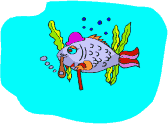 |
Fishing Stories from Ned Kehde |
|
Fishing Reports Reader's Nook Angler's Academy Club Corner Tournament Trail Success Stories Kansas Angler Info Angler Links |
Submitted by Ned Kehde - Feb 19, 2001 When John Paulson of Lawrence is afloat at Clinton Lake during May and June, he is often in pursuit of the flathead catfish. This is, however, such an uncommon endeavor that there is only a tiny coterie of fishermen chasing this species across Clinton's 7,000 acres. One reason why a lot of anglers don't attempt to catch the flathead is that it requires too much resolve, and their population at Clinton is comparatively slim. Even though they aren't abundant, a few diligent anglers have tangled with some Goliaths. For instance, John Thompson of Ottawa caught and released an 80-pounder last May by employing a log line and a large sunfish. Thompson is the savviest flathead angler hereabouts, and his method is the traditional one that most fishermen use. In comparison, Paulson is a precocious neophyte who regularly employs tactics that go beyond the traditional approaches for catching flatheads. Paulson, for example, will troll crankbaits, like a walleye angler, to entice flatheads just before they become possessed with the grip of procreation. As a troller, Paulson hasn't caught any titans, but he has tangled with some good ones, including a 19- and 28 -pounder. And he is convinced that trolling is an effective method for luring big flathead catfish in the weeks prior to the spawn. For Paulson, trolling for flatheads was a serendipitous discovery that occurred when he was pursuing another species, which is the way many great angling tactics evolve. And by being a troller for flatheads, Paulson is in the vanguard of the angling world, joining a movement spearheaded by some of the folks at In-Fisherman magazine and television. Besides being on the cutting edge of catfish angling, Paulson is leading another trailblazing crusade. This time he has taken up the gauntlet to delay the aging of Clinton Lake and improve the fishing. During this long and harsh winter, he read discursively and pondered the alternatives and wrote letters, seeking advice from a variety of experts and such organizations as the U.S. Army Corps of Engineers, Kansas Water Office and Kansas Wildlife and Parks. Ultimately, he formulated a four-part plan. The first part is design to replicate the great benefits of the drought-flood cycle, which seldom occur in northeastern Kansas. To do this, Paulson said modern farm implements are employed to cut and bale tons of weeds, grasses and buck brush. Then these cuttings are broadcast into the water all around the lake and allowed to decay. Another piece of the plan revolves around the construction of massive riprap reefs, which would be designed to retard siltation and erosion. These rocky reefs would also create ideal spawning habitat for a variety of species, as well as spots for fish to forage. The third plank of Paulson's formula revolves around attracting airborne insects for the fish to feed upon, and the insects can be attracted by installing lights over the water, using some of the same technology the KWP employees for it catfish feeders. The last item is the construction of shoreline and offshore habitats. Paulson sent his plan to the KWP more than a month ago, and he hasn't received a reply. From that slow response, Paulson says that he is learning a little bit about the politics of water control. Now he suspects that garnering a reaction from the many bureaucracies that deal with Kansas waterways might be more difficult than catching a big catfish.
|
|
Kansas Angler Online Sponsor  |
Copyright 2001 by The Kansas Angler - P.O. Box 12261 - Wichita, KS 67211 - Phone 316-265-5551 Questions or problems with this website should be directed the link above. This Page Last Updated on date shown at top of page. |

